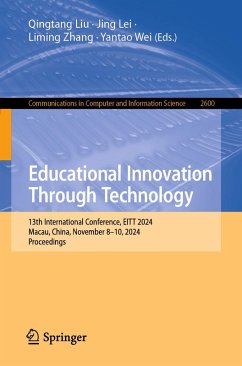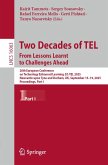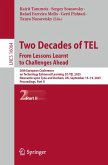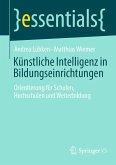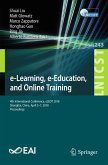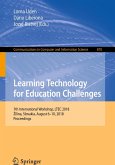Educational Innovation Through Technology (eBook, PDF)
13th International Conference, EITT 2024, Macau, China, November 8-10, 2024, Proceedings
Redaktion: Liu, Qingtang; Wei, Yantao; Zhang, Liming; Lei, Jing
68,95 €
68,95 €
inkl. MwSt.
Sofort per Download lieferbar

34 °P sammeln
68,95 €
Als Download kaufen

68,95 €
inkl. MwSt.
Sofort per Download lieferbar

34 °P sammeln
Jetzt verschenken
Alle Infos zum eBook verschenken
68,95 €
inkl. MwSt.
Sofort per Download lieferbar
Alle Infos zum eBook verschenken

34 °P sammeln
Educational Innovation Through Technology (eBook, PDF)
13th International Conference, EITT 2024, Macau, China, November 8-10, 2024, Proceedings
Redaktion: Liu, Qingtang; Wei, Yantao; Zhang, Liming; Lei, Jing
- Format: PDF
- Merkliste
- Auf die Merkliste
- Bewerten Bewerten
- Teilen
- Produkt teilen
- Produkterinnerung
- Produkterinnerung

Bitte loggen Sie sich zunächst in Ihr Kundenkonto ein oder registrieren Sie sich bei
bücher.de, um das eBook-Abo tolino select nutzen zu können.
Hier können Sie sich einloggen
Hier können Sie sich einloggen
Sie sind bereits eingeloggt. Klicken Sie auf 2. tolino select Abo, um fortzufahren.

Bitte loggen Sie sich zunächst in Ihr Kundenkonto ein oder registrieren Sie sich bei bücher.de, um das eBook-Abo tolino select nutzen zu können.
The volume CCIS 2600 constitutes the refereed post-conference proceedings of the 13th International Conference of Educational Innovation through Technology, EITT 2024, Macau, China, during November 8-10, 2024.
The 17 revised full papers and 7 short papers presented in these proceedings were carefully reviewed and selected from 78 submissions. The papers are organized in the following topical sections: AI-Powered Educational Innovation, Tech-Enhanced Curriculum & Teaching Innovations, and AI-driven Learning Analytics & Assessment.
- Geräte: PC
- ohne Kopierschutz
- eBook Hilfe
- Größe: 33.72MB
Andere Kunden interessierten sich auch für
![Two Decades of TEL. From Lessons Learnt to Challenges Ahead (eBook, PDF) Two Decades of TEL. From Lessons Learnt to Challenges Ahead (eBook, PDF)]() Two Decades of TEL. From Lessons Learnt to Challenges Ahead (eBook, PDF)64,95 €
Two Decades of TEL. From Lessons Learnt to Challenges Ahead (eBook, PDF)64,95 €![Two Decades of TEL. From Lessons Learnt to Challenges Ahead (eBook, PDF) Two Decades of TEL. From Lessons Learnt to Challenges Ahead (eBook, PDF)]() Two Decades of TEL. From Lessons Learnt to Challenges Ahead (eBook, PDF)52,95 €
Two Decades of TEL. From Lessons Learnt to Challenges Ahead (eBook, PDF)52,95 €![Technology in Education. Smart and Innovative Learning (eBook, PDF) Technology in Education. Smart and Innovative Learning (eBook, PDF)]() Technology in Education. Smart and Innovative Learning (eBook, PDF)68,95 €
Technology in Education. Smart and Innovative Learning (eBook, PDF)68,95 €![Fliegen lernen (eBook, PDF) Fliegen lernen (eBook, PDF)]() Mario DonickFliegen lernen (eBook, PDF)22,99 €
Mario DonickFliegen lernen (eBook, PDF)22,99 €![Künstliche Intelligenz in Bildungseinrichtungen (eBook, PDF) Künstliche Intelligenz in Bildungseinrichtungen (eBook, PDF)]() Andrea LübkenKünstliche Intelligenz in Bildungseinrichtungen (eBook, PDF)7,48 €
Andrea LübkenKünstliche Intelligenz in Bildungseinrichtungen (eBook, PDF)7,48 €![e-Learning, e-Education, and Online Training (eBook, PDF) e-Learning, e-Education, and Online Training (eBook, PDF)]() e-Learning, e-Education, and Online Training (eBook, PDF)40,95 €
e-Learning, e-Education, and Online Training (eBook, PDF)40,95 €![Learning Technology for Education Challenges (eBook, PDF) Learning Technology for Education Challenges (eBook, PDF)]() Learning Technology for Education Challenges (eBook, PDF)40,95 €
Learning Technology for Education Challenges (eBook, PDF)40,95 €-
-
-
The volume CCIS 2600 constitutes the refereed post-conference proceedings of the 13th International Conference of Educational Innovation through Technology, EITT 2024, Macau, China, during November 8-10, 2024.
The 17 revised full papers and 7 short papers presented in these proceedings were carefully reviewed and selected from 78 submissions. The papers are organized in the following topical sections: AI-Powered Educational Innovation, Tech-Enhanced Curriculum & Teaching Innovations, and AI-driven Learning Analytics & Assessment.
The 17 revised full papers and 7 short papers presented in these proceedings were carefully reviewed and selected from 78 submissions. The papers are organized in the following topical sections: AI-Powered Educational Innovation, Tech-Enhanced Curriculum & Teaching Innovations, and AI-driven Learning Analytics & Assessment.
Dieser Download kann aus rechtlichen Gründen nur mit Rechnungsadresse in A, B, BG, CY, CZ, D, DK, EW, E, FIN, F, GR, HR, H, IRL, I, LT, L, LR, M, NL, PL, P, R, S, SLO, SK ausgeliefert werden.
Produktdetails
- Produktdetails
- Verlag: Springer Nature Singapore
- Seitenzahl: 302
- Erscheinungstermin: 19. August 2025
- Englisch
- ISBN-13: 9789819515257
- Artikelnr.: 75246695
- Verlag: Springer Nature Singapore
- Seitenzahl: 302
- Erscheinungstermin: 19. August 2025
- Englisch
- ISBN-13: 9789819515257
- Artikelnr.: 75246695
- Herstellerkennzeichnung Die Herstellerinformationen sind derzeit nicht verfügbar.
.- AI-Powered Educational Innovation.
.- Empowering Elementary School English Review Lessons with Generative AI: Constructing the RCPA Human-Machine Collaborative Teaching Model.
.- Design and Development of an LLM-empowered Arguing Pedagogical Agent with a Personalized Avatar, Movements, and Voice.
.- Student Emotion Recognition Research Based on Deep Learning Techniques: An Example of Primary and Secondary School Classrooms.
.- The Influence of GAI on the Development of Students Higher-Order Thinking Ability: Meta-Analysis Based on Relevant Empirical Studies at Home and Abroad Since 2022.
.- Design of Knowledge Graph Solutions to Enhance Resilience in STEM Education.
.- Understanding College Students' AI Literacy in Course Essays: A Topic Modeling-Based Method.
.- Emotion Recognition for Learners Based on Facial Expressions and BVP Signals.
.- Making AI Forget You: Removing Educational Data from Intelligent Education Models.
.- A Low-consumption Teaching Role Recognition Method for Teaching Analysis.
.- Open Management of Research-oriented Laboratories in Universities Based on an AI for Science Paradigm.
.- Tech-Enhanced Curriculum & Teaching InnovationsSTE.
.- STEM, Cultural Heritage, and Junior High School Labor Curriculum: An Example of the 3-way Luban Lock C-STEAM Project.
.- LIDT Framework and Implementation of Life-Oriented Instructional Design for Preschool Children s Scientific Activities Empowered by Digital Intelligence Technology.
.- A Practical Study of AR Technology-enabled Children's Immersion Learning.
.- Research on the Construction and Application of a Multi-agent Collaborative Digital Volunteer Education Model.
.- Can Information Technology Bridge Cultural Differencesc? Design and Effectiveness Analysis of COIL Based on Intercultural Communication.
.- Design, Implementation, and Application of a 3-D Virtual Simulation Visualization Experiment System for Camera Calibration.
.- AI-driven Learning Analytics & Assessment.
.- Optimizing the Assessment System of Integrated Course Design through Causal Inference.
.- Evaluation and Continuous Improvement of Graduation Design Based on Causal Inference.
.- Assessment of an AI-Assisted Power Supply Experiment Design Based on Causal Inference.
.- A Measurement Method of Knowledge Contribution by Learners During a Design Process.
.- Investigating How Self-Recording and Playback Influence Music Students Self-Assessment.
.- Exploring the Influencing Factors of Pupil Gratification towards Elementary School Library Services: A TAM-Based Study.
.- What Characteristics of Social Media Make Teachers' Learning and Training Effective.
.- Undersea Adventure (UA): A Stealth Approach to Collaborative Skills Assessment in Schools.
.- Empowering Elementary School English Review Lessons with Generative AI: Constructing the RCPA Human-Machine Collaborative Teaching Model.
.- Design and Development of an LLM-empowered Arguing Pedagogical Agent with a Personalized Avatar, Movements, and Voice.
.- Student Emotion Recognition Research Based on Deep Learning Techniques: An Example of Primary and Secondary School Classrooms.
.- The Influence of GAI on the Development of Students Higher-Order Thinking Ability: Meta-Analysis Based on Relevant Empirical Studies at Home and Abroad Since 2022.
.- Design of Knowledge Graph Solutions to Enhance Resilience in STEM Education.
.- Understanding College Students' AI Literacy in Course Essays: A Topic Modeling-Based Method.
.- Emotion Recognition for Learners Based on Facial Expressions and BVP Signals.
.- Making AI Forget You: Removing Educational Data from Intelligent Education Models.
.- A Low-consumption Teaching Role Recognition Method for Teaching Analysis.
.- Open Management of Research-oriented Laboratories in Universities Based on an AI for Science Paradigm.
.- Tech-Enhanced Curriculum & Teaching InnovationsSTE.
.- STEM, Cultural Heritage, and Junior High School Labor Curriculum: An Example of the 3-way Luban Lock C-STEAM Project.
.- LIDT Framework and Implementation of Life-Oriented Instructional Design for Preschool Children s Scientific Activities Empowered by Digital Intelligence Technology.
.- A Practical Study of AR Technology-enabled Children's Immersion Learning.
.- Research on the Construction and Application of a Multi-agent Collaborative Digital Volunteer Education Model.
.- Can Information Technology Bridge Cultural Differencesc? Design and Effectiveness Analysis of COIL Based on Intercultural Communication.
.- Design, Implementation, and Application of a 3-D Virtual Simulation Visualization Experiment System for Camera Calibration.
.- AI-driven Learning Analytics & Assessment.
.- Optimizing the Assessment System of Integrated Course Design through Causal Inference.
.- Evaluation and Continuous Improvement of Graduation Design Based on Causal Inference.
.- Assessment of an AI-Assisted Power Supply Experiment Design Based on Causal Inference.
.- A Measurement Method of Knowledge Contribution by Learners During a Design Process.
.- Investigating How Self-Recording and Playback Influence Music Students Self-Assessment.
.- Exploring the Influencing Factors of Pupil Gratification towards Elementary School Library Services: A TAM-Based Study.
.- What Characteristics of Social Media Make Teachers' Learning and Training Effective.
.- Undersea Adventure (UA): A Stealth Approach to Collaborative Skills Assessment in Schools.
.- AI-Powered Educational Innovation.
.- Empowering Elementary School English Review Lessons with Generative AI: Constructing the RCPA Human-Machine Collaborative Teaching Model.
.- Design and Development of an LLM-empowered Arguing Pedagogical Agent with a Personalized Avatar, Movements, and Voice.
.- Student Emotion Recognition Research Based on Deep Learning Techniques: An Example of Primary and Secondary School Classrooms.
.- The Influence of GAI on the Development of Students Higher-Order Thinking Ability: Meta-Analysis Based on Relevant Empirical Studies at Home and Abroad Since 2022.
.- Design of Knowledge Graph Solutions to Enhance Resilience in STEM Education.
.- Understanding College Students' AI Literacy in Course Essays: A Topic Modeling-Based Method.
.- Emotion Recognition for Learners Based on Facial Expressions and BVP Signals.
.- Making AI Forget You: Removing Educational Data from Intelligent Education Models.
.- A Low-consumption Teaching Role Recognition Method for Teaching Analysis.
.- Open Management of Research-oriented Laboratories in Universities Based on an AI for Science Paradigm.
.- Tech-Enhanced Curriculum & Teaching InnovationsSTE.
.- STEM, Cultural Heritage, and Junior High School Labor Curriculum: An Example of the 3-way Luban Lock C-STEAM Project.
.- LIDT Framework and Implementation of Life-Oriented Instructional Design for Preschool Children s Scientific Activities Empowered by Digital Intelligence Technology.
.- A Practical Study of AR Technology-enabled Children's Immersion Learning.
.- Research on the Construction and Application of a Multi-agent Collaborative Digital Volunteer Education Model.
.- Can Information Technology Bridge Cultural Differencesc? Design and Effectiveness Analysis of COIL Based on Intercultural Communication.
.- Design, Implementation, and Application of a 3-D Virtual Simulation Visualization Experiment System for Camera Calibration.
.- AI-driven Learning Analytics & Assessment.
.- Optimizing the Assessment System of Integrated Course Design through Causal Inference.
.- Evaluation and Continuous Improvement of Graduation Design Based on Causal Inference.
.- Assessment of an AI-Assisted Power Supply Experiment Design Based on Causal Inference.
.- A Measurement Method of Knowledge Contribution by Learners During a Design Process.
.- Investigating How Self-Recording and Playback Influence Music Students Self-Assessment.
.- Exploring the Influencing Factors of Pupil Gratification towards Elementary School Library Services: A TAM-Based Study.
.- What Characteristics of Social Media Make Teachers' Learning and Training Effective.
.- Undersea Adventure (UA): A Stealth Approach to Collaborative Skills Assessment in Schools.
.- Empowering Elementary School English Review Lessons with Generative AI: Constructing the RCPA Human-Machine Collaborative Teaching Model.
.- Design and Development of an LLM-empowered Arguing Pedagogical Agent with a Personalized Avatar, Movements, and Voice.
.- Student Emotion Recognition Research Based on Deep Learning Techniques: An Example of Primary and Secondary School Classrooms.
.- The Influence of GAI on the Development of Students Higher-Order Thinking Ability: Meta-Analysis Based on Relevant Empirical Studies at Home and Abroad Since 2022.
.- Design of Knowledge Graph Solutions to Enhance Resilience in STEM Education.
.- Understanding College Students' AI Literacy in Course Essays: A Topic Modeling-Based Method.
.- Emotion Recognition for Learners Based on Facial Expressions and BVP Signals.
.- Making AI Forget You: Removing Educational Data from Intelligent Education Models.
.- A Low-consumption Teaching Role Recognition Method for Teaching Analysis.
.- Open Management of Research-oriented Laboratories in Universities Based on an AI for Science Paradigm.
.- Tech-Enhanced Curriculum & Teaching InnovationsSTE.
.- STEM, Cultural Heritage, and Junior High School Labor Curriculum: An Example of the 3-way Luban Lock C-STEAM Project.
.- LIDT Framework and Implementation of Life-Oriented Instructional Design for Preschool Children s Scientific Activities Empowered by Digital Intelligence Technology.
.- A Practical Study of AR Technology-enabled Children's Immersion Learning.
.- Research on the Construction and Application of a Multi-agent Collaborative Digital Volunteer Education Model.
.- Can Information Technology Bridge Cultural Differencesc? Design and Effectiveness Analysis of COIL Based on Intercultural Communication.
.- Design, Implementation, and Application of a 3-D Virtual Simulation Visualization Experiment System for Camera Calibration.
.- AI-driven Learning Analytics & Assessment.
.- Optimizing the Assessment System of Integrated Course Design through Causal Inference.
.- Evaluation and Continuous Improvement of Graduation Design Based on Causal Inference.
.- Assessment of an AI-Assisted Power Supply Experiment Design Based on Causal Inference.
.- A Measurement Method of Knowledge Contribution by Learners During a Design Process.
.- Investigating How Self-Recording and Playback Influence Music Students Self-Assessment.
.- Exploring the Influencing Factors of Pupil Gratification towards Elementary School Library Services: A TAM-Based Study.
.- What Characteristics of Social Media Make Teachers' Learning and Training Effective.
.- Undersea Adventure (UA): A Stealth Approach to Collaborative Skills Assessment in Schools.
